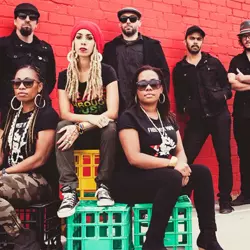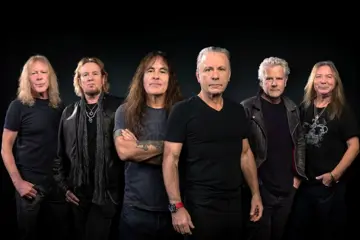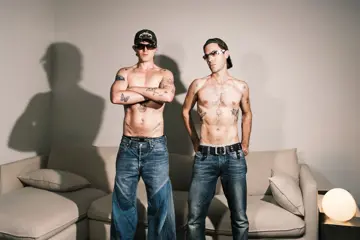 Blue King Brown
Blue King Brown"We're just wrapping up a track we've done with him today,” Blue King Brown's dynamic frontwoman Natalie Pa'apa'a explains, on the line from the South Melbourne studio of producer Styalz Fuego – best known for his work with R&B and hip hop artists like 360, for whom he produced the quadruple-platinum album Boys Like You, which won him the 2012 ARIA Producer Of The Year Award. A singer and songwriter in his own right, Fuego is signed to Sony/ATV Publishing worldwide, is co-founder of production and management company Affinity Music Group and is one half of electronic/dance group '96 Bulls.
“With this album, it's a little bit different,” she continues. “Our previous albums, we've done a lot of the production ourselves. However, we sort of wanted to open up that circle a bit wider this time and bring in some outside creativity. So Styalz is one of those people and the other main producer that we've been working with is Jake Savona, another Melbourne-based producer who records as Mista Savona, really knowledgeable and into everything reggae – roots, old-school to new-school and dancehall. He's got really good ears as well.”
An MD, keyboardist, engineer and songwriter, Savona is also the first Australian producer to release his own riddim series of records in Jamaica.
“Each of these guys have their own studios, but we've been working a lot at our home studio as well, and we've done some work at Sing Sing [Studios]. I guess each producer brings a different style, a different flavour, and that's what's exciting. It's part of the process of opening up that circle, as I said, and letting go. We've always been very protective of our music and very nitpicky and all that stuff, and just opening that to outside opinion, that was a big step,” she laughs, “in itself. It's good to do that, and what has come back has made the songs better, whether it's a chord change or the change of a sound, a better sounding instrument than the one we had or an effect on top of what we'd done, or taking that out and putting something in. It's all the little things that really give the song its sonic fullness. Hopefully they sound fuller, bigger, all that good stuff.”
For their previous album, Worldwize: Part 1 – North & South, Blue King Brown tracked all the instrumentation in Melbourne, and then took the tracks to Kingston, Jamaica, to record the vocals as well as adding performances by a number of guests including the reggae rhythm section, Sly Dunbar and Robbie Shakespeare. So how is the songwriting evolving on this next album?
Don't miss a beat with our FREE daily newsletter
“It's definitely an evolution of our songwriting and our style, and our musical influences – it's the next chapter, however, it's not necessarily part two. We still wrote all the songs – they're still very much our babies. The strongest flavour on this album is reggae, which I love,” she laughs. “So I'm stoked about that, and it's sounding really good. We've done a bunch of mixing already. We've still been working with our mix engineer from our previous album, James 'Bonzai' Caruso, who works in [Las] Vegas. He was out here working with us in Sing Sing a couple of months ago, so we did some mixing there. We're still sussing out our options with mastering.”
New Yorker Caruso is a four-time Grammy Award-winning recording engineer, producer, arranger and songwriter who got his start in 1982, aged 17, working as an assistant engineer at Secret Sound Studios in Manhattan. He made his name, however, mixing records by Grand Master Flash, Africa Bambaataa, Madonna and Ice T among many, and has recorded and produced albums for Stephen, Nas and Damian Marley, which gives him just the right reggae credentials for Blue King Brown.
Joining Blue King Brown on this new album and live on stage are the powerful vocals of Lea and Petra Rumwaropen, daughters of the late Agosto Rumwaropen, singer, songwriter and lead guitarist with one of Indonesian-controlled West Papua's most recognised and outspoken acts of the '60s through '80s, The Black Brothers.
“The voices are very important obviously for Blue King Brown, not only for the melodic attributes but also lyrically, we're still very passionate and lyrically driven. The girls are really passionate about the cause of freedom for West Papua and are also amazing singers.
“There's definitely more exploration of my voice on this new album, mainly because I've always been an instrumentalist and singing is something that has been relatively new to me, and I still feel like I'm a real beginner in that sense. Every album, I feel like my voice gets a bit better and for this album, I'd done that much more singing and the vocals are stronger, and I feel more confident singing in different registers than I did before, and I feel more confident going through my own harmonies than I have before. So vocally it's definitely I believe my strongest performance and, I dunno, I've really sort of unlocked a bit of my own sort of the unique sound in my voice somewhere, which is exciting because you can only hope you can get better as a singer.”
And capturing that now unlocked vocal sound is a Neumann U47 microphone, a large-diaphragm condenser tube mic originally developed and manufactured in 1949 and used extensively by producer George Martin to record The Beatles' vocal performances. Not that Natalie owns one, but it's still her favourite – “the number one go-to for my voice, for sure.”















